All the latest dog statisticsin Montreal you need to know
Key Insights
| According to CTV News, dog ownership in Quebec increased from 25% to 28% in 2021, though cats remain more popular, with 2.134 million cats compared to 1.118 million dogs. As per a report from CTV News, dog ownership in Quebec is higher in households with children (31%) than in child-free homes (22%), while younger adults aged 18 to 34 are more likely to own pets. Montreal SPCA reported a record number of pet abandonments in 2023, with shelters at full capacity, citing rising pet ownership costs as a major factor. According to The Gazette, pet surrenders at the Montreal SPCA spiked 21% in early 2024, with dog surrenders rising to 35% in the same year. |
Dog ownership is a crucial part of the lives of many Montreal residents. However, owning a dog also comes with responsibilities, legal considerations, and societal challenges that impact both pet owners and the city.
This study explores the state of dog ownership in Montreal, highlighting important data on population trends, adoption patterns, and regulatory measures.
By looking into these numbers, we can gain valuable insights into challenges, local policies, and how dogs impact lives in the city.
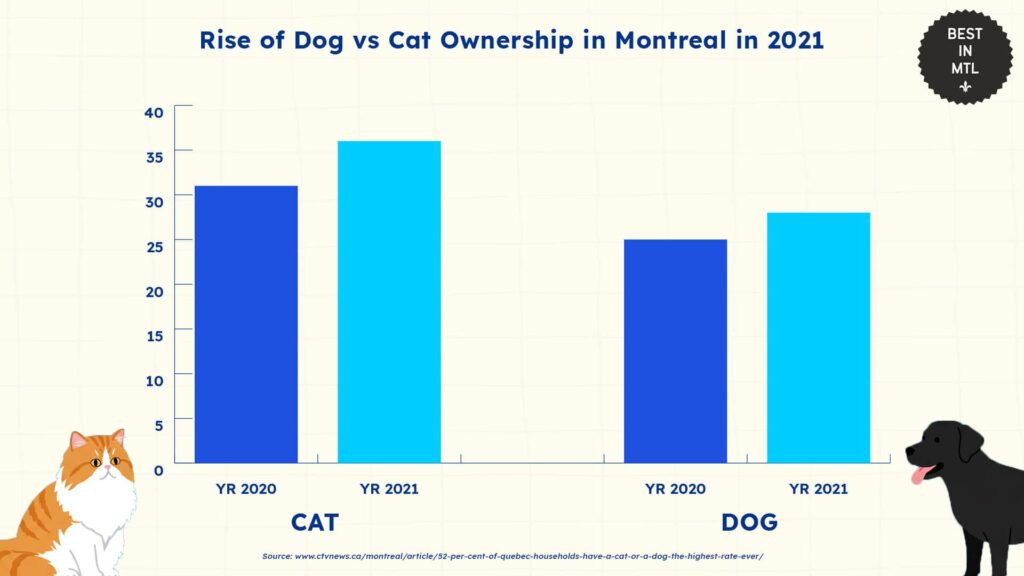
It’s important to look at Quebec as a whole first to understand dog ownership in Montreal. According to CTV news, the COVID-19 pandemic was a contributing factor to the rise of pet ownership in the province.
In 2021, dog ownership has risen from 25% to 28% in Quebec. However, despite the increase in dog ownership, cats remain the more popular pet in Quebec, with an estimated population of 2.134 million compared to 1.118 million dogs in 2021.
Demographics of dog owners in Montreal
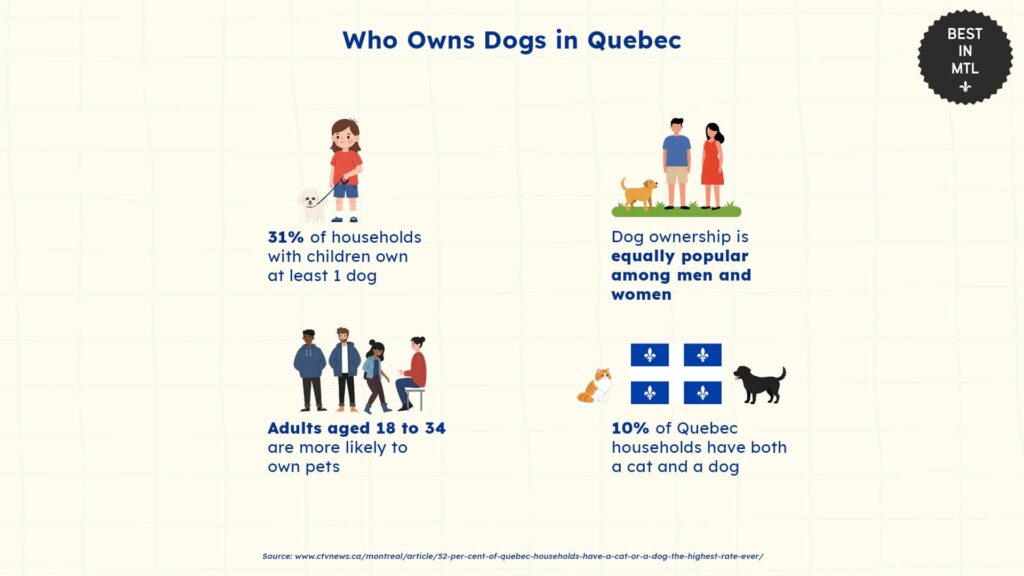
In the same report from CTV News, the demographics of dog ownership in Quebec reveal interesting patterns in household, age, and gender.
The 2021 report shows that households with children are more likely to own dogs, with 31% having at least one dog. In comparison, only 22% of child-free households have at least one dog.
In terms of gender, dog ownership appears to be equally popular among men and women. This is unlike cat ownership, with cats being more popular with 42% of women.
Age is another factor. Younger adults aged 18 to 34 are more likely to own pets, including both cats and dogs, than those aged 55 and older.
Interestingly, 10% of households in Quebec have both a cat and a dog.
Geographic differences also reveal important insights. The report found that cats and dogs are least represented in the Quebec metropolitan area, likely due to housing restrictions, urban living conditions, or lifestyle preferences.
Dog-friendly infrastructure in Montreal
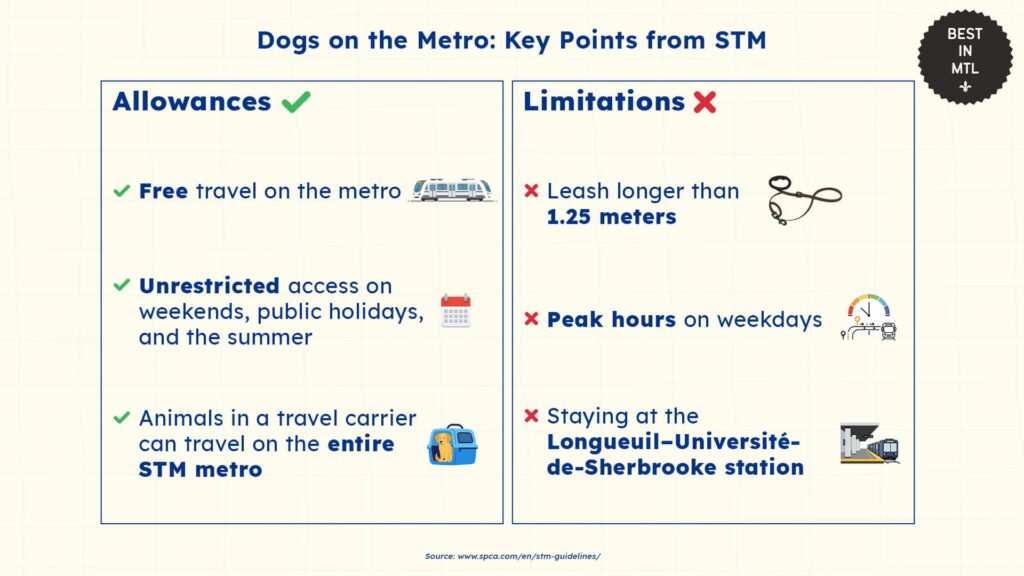
According to the Montreal SPCA, Montreal has made significant progress in accommodating dog owners. For instance, Société de transport de Montréal (STM) has allowed leashed dogs to travel on the metro as part of a project launched in 2022.
Under the current rules, dogs can travel for free on the metro. Additionally, they have unrestricted access on weekends, public holidays, and during the summer.
However, there are certain restrictions. Dogs aren’t allowed on buses and may only ride the metro during off-peak hours on weekdays.
Guidelines also state that dogs must be on a leash no longer than 1.25 meters and must wear a muzzle at all times while inside the metro. And despite being leashed, dogs are still not allowed in the Longueuil–Université-de-Sherbrooke station.
While there are restrictions in place, the initiative provides greater mobility for dog owners in urban centres.
Trends in dog adoption and shelters in Montreal
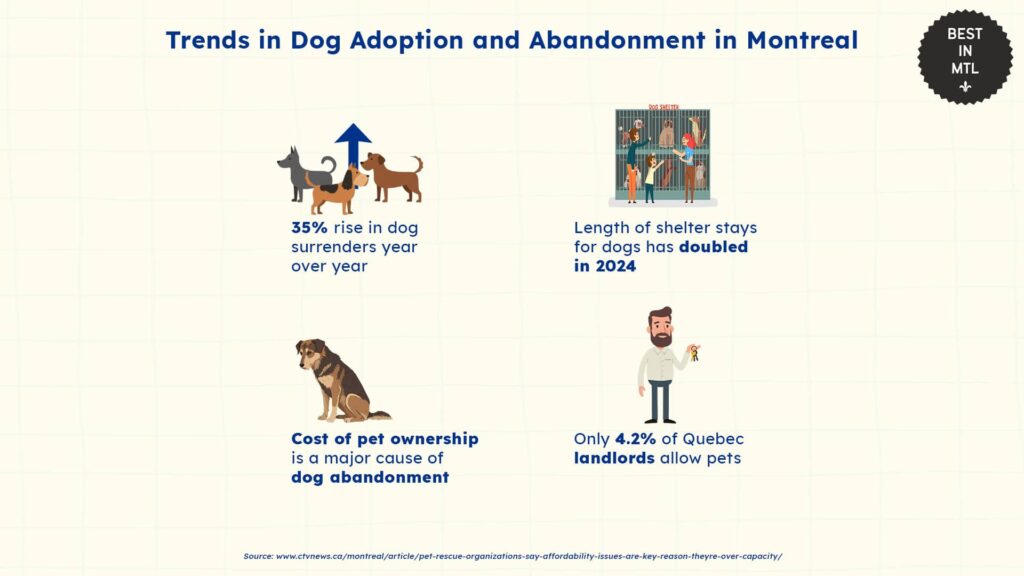
While it’s clear that Quebec dog ownership remains solid, the trend of dog adoption in Montreal isn’t showing positive signs.
According to a 2025 report from CTV News, the Montreal SPCA shared that shelters and rescue organisations are facing an unprecedented number of abandoned pets, with 2024 marking a record year for animal admissions.
Animal shelters in Montreal are now operating at full capacity, with the SPCA housing 200 animals in-house and over 500 in foster care.
Rescue and adoption centres often note that the cost of pet ownership has become a significant burden for many families. The SPCA estimates that annual expenses can reach $4,000 for a dog, while unexpected veterinary costs can cost thousands more.
Pet abandonment rates in Montreal
According to The Gazette, moving day on July 1 has been the busiest time for pet abandonments.
The number of surrendered pets at the Montreal SPCA has increased by 21% in the first few months of 2024 compared to the same period in 2023.
The situation is particularly severe for dogs, with a 35% rise in surrenders year over year. This trend initially began after the pandemic, as many owners realised they could no longer care for the pets they impulsively adopted.
In addition to more surrenders, The Gazette also reported another concerning trend. In particular, dogs stay in shelters for much longer than before. The average length of stay for dogs has nearly doubled as of 2024.
Another major issue contributing to low dog adoption rates is housing restrictions. Many landlords in Quebec don’t allow pets. Only 4.2% of landlords permit dogs in rental housing, according to CTV News.
Health benefits of dog ownership in Montreal
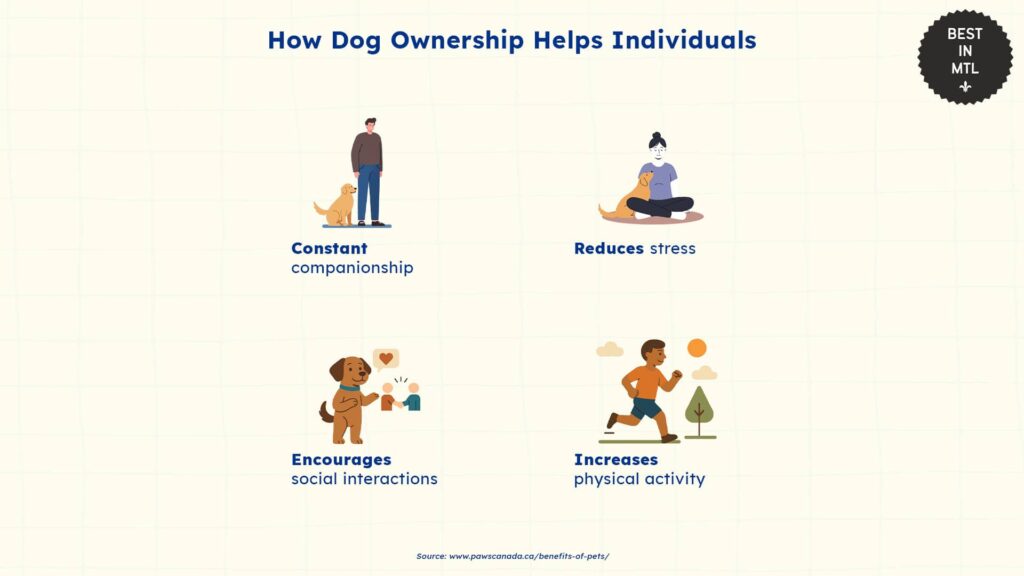
Dog ownership is a privilege. Still, while it can be a financially straining endeavor, it remains beneficial for most households.
According to Paws Canada, finding effective ways to manage mental health is more important than ever, with 5 in 1 Canadians experiencing mental illness. Fortunately, pets, especially dogs, can offer emotional support and stability.
According to Paws Canada, some of the mental health benefits of dog ownership include:
- Companionship and Support: Dogs provide unconditional love, helping to ease feelings of anxiety, depression, and loneliness.
- Reducing Stress: The presence of dogs can lower stress levels and promote relaxation by releasing oxytocin and serotonin.
- Encouraging Social Connections: Dog owners often build friendships through casual conversations at dog parks, obedience classes, and pet events.
- Increased Physical Activity: Walking, playing, or running with a dog helps owners stay active. In turn, this reduces the risk of heart disease, diabetes, and obesity.
Challenges and responsibilities of dog ownership in Montreal
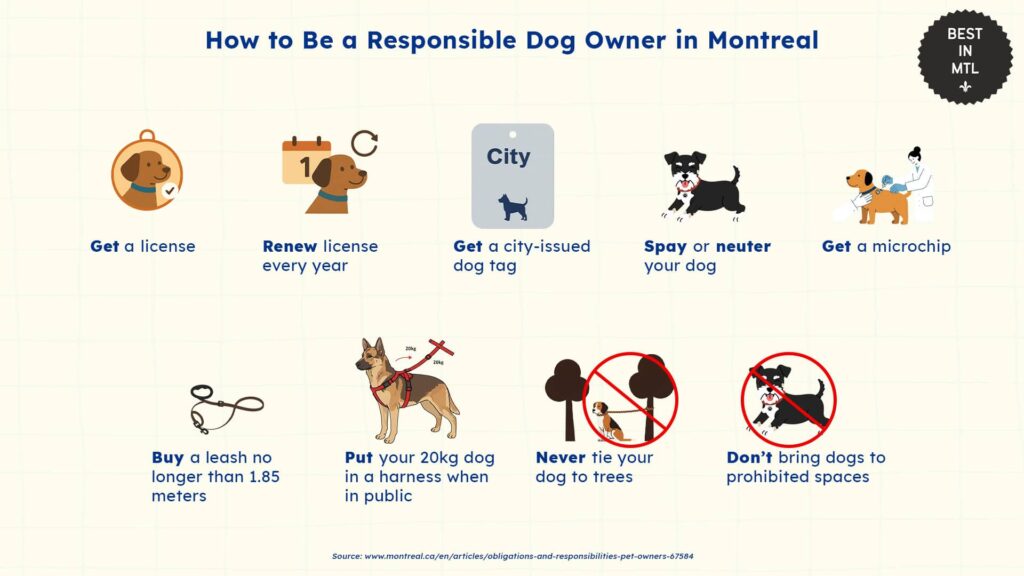
The Government of Montreal has provincial regulations and municipal by-laws governing dog ownership in Montreal, starting March 3, 2020.
Key responsibilities of dog owners in Montreal
- Licensing and Identification: Dog owners must obtain a valid license and renew it yearly. They must also wear a city-issued tag at all times.
- Spaying/Neutering and Microchipping: Owners must ensure their dogs are sterilised and microchipped to prevent overpopulation and help identify pets.
- Leash and Harness Rules: Dogs must be kept on a leash no longer than 1.85 meters in public spaces. Dogs over 20kg must also wear a harness or halter.
Beyond these, owners are responsible for their dogs’ behavior as well. For instance, dogs must not disturb others, be tied to trees, or be brought to certain public spaces like playgrounds and playing fields.
Basic rules on dog ownership in Montreal
Apart from the responsibilities, the Government of Montreal has established limits on the number of pets allowed per household. Key regulations include
- A maximum of 3 dogs per household
- A combined total of 4 cats and dogs
- Other small pets (birds, reptiles, amphibians) are allowed but must meet city guidelines
- Fish don’t count toward the pet limit
Montreal allows exceptions for those involved in pet rescue, such as foster families working with registered shelters. Regulations include:
- Foster homes can have a maximum of 3 dogs
- Foster homes can have up to 8 cats
- The shelter must be registered with Ministère de l’Agriculture, des Pêcheries et de l’Alimentation du Québec (MAPAQ)
Dog welfare and advocacy in Montreal
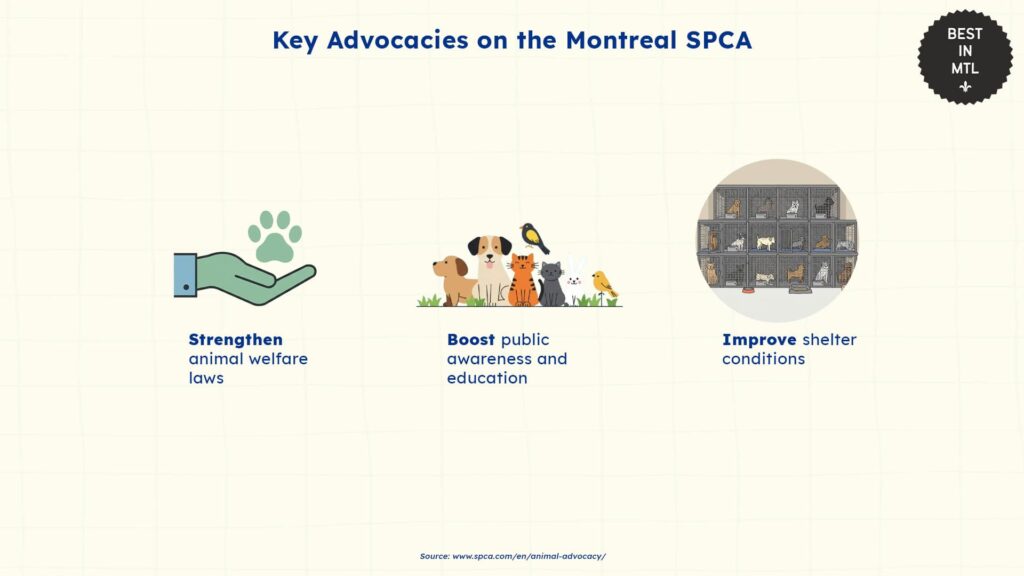
The Montreal SPCA, established in 1869, is one of the biggest advocates of dog welfare in Montreal.
Among the many aspects of their work is legislative reform. The SPCA’s Animal Advocacy department works to strengthen laws, policies, and regulations related to animal welfare.
Beyond legal efforts, they’re also dedicated to public awareness and education. Their efforts usually involve running campaigns to inform the public about animal protection issues.
Over the years, the Montreal SPCA has secured major victories in animal protection. Their influence has helped improve shelter conditions, promote responsible pet ownership, and fight for stronger enforcement of animal welfare laws.
References
- CTV News. 52 per cent of Quebec households have a cat or a dog, the highest rate ever (2021). https://www.ctvnews.ca/montreal/article/52-per-cent-of-quebec-households-have-a-cat-or-a-dog-the-highest-rate-ever/
- CTV News. Pet rescue organisations say affordability issues are key reason they’re over capacity (2025). https://www.ctvnews.ca/montreal/article/pet-rescue-organizations-say-affordability-issues-are-key-reason-theyre-over-capacity/
- Government of Montreal. Obligations and responsibilities of pet owners (2024). https://montreal.ca/en/articles/obligations-and-responsibilities-pet-owners-67584
- Government of Montreal. Pets: Authorized species and numbers (2024). https://montreal.ca/en/articles/pets-authorized-species-and-numbers-67567
- Montreal SPCA. FIDO IN THE METRO: GUIDELINES AND TIPS (n.d.) https://www.spca.com/en/stm-guidelines/
- Montreal SPCA. Animal Advocacy (n.d.). https://www.spca.com/en/animal-advocacy/
- Paws Canada. Benefits of Pets (n.d.). https://pawscanada.ca/benefits-of-pets/
- The Gazette. The Montreal SPCA is crowded with pets awaiting adoption, even before July 1 (2024). https://www.montrealgazette.com/news/article141955.html













